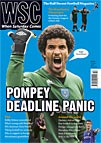 Saul Pope looks at the relationship between short-term solution, long-term planning and nationality in Russian football
Saul Pope looks at the relationship between short-term solution, long-term planning and nationality in Russian football
Considering he was sacked by his club following a series of disappointing results, the warm send-off Dick Advocaat received from Zenit St Petersburg fans was unusual and pleasantly surprising. In a league where managers from outside the former USSR have struggled to make a serious impact and many have been fired within a few months, his achievements with Zenit should also not be underestimated.